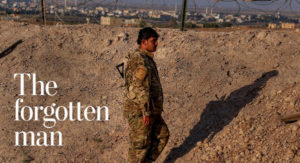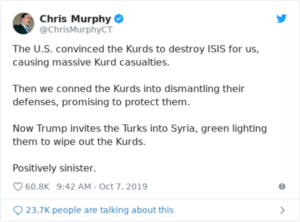 The Washington Post
The Washington Post
(Ahmad Baderkhan/AP)
Edited by Ruby Mellen
Already locked in a heated impeachment battle, President Trump found a new way to rile Washington this week. Late Sunday, the White House announced that it would not impede an imminent Turkish invasion into northeastern Syria. By Monday morning, my colleagues confirmed that the United States had begun withdrawing troops from the Syrian-Turkish border, where they had been stationed alongside U.S.-allied Syrian Kurdish fighters. It seemed the first phase of a possibly new and destabilizing military conflagration in war-ravaged Syria. By Monday evening, there were already reports of Turkish artillery shelling and airstrikes on Syrian Kurdish positions.
The moves followed a Sunday phone call between Trump and Turkish President Recep Tayyip Erdogan, whose government considers the main Syrian Kurdish faction that fought the Islamic State to be as much of a danger as the Islamist militants themselves. That’s because of their direct ties to the Kurdistan Workers’ Party, or PKK, an outlawed separatist group in Turkey that’s designated as a terrorist organization by Washington and Ankara.
Erdogan and his government long resented the outsize influence of the Syrian Democratic Forces, the name of the coalition of Syrian Kurdish-led militias that was instrumental in rolling back the Islamic State, as well as the outside support they received from the United States and other European partners. No matter the thousands of lives lost by the SDF, Trump now appears to have given Erdogan what he’s wanted — an open invitation to weaken if not break Rojava (what Syrian Kurds call an enclave in northeastern Syria largely administered by the SDF) and potentially repopulate a belt of territory with Syrian refugees currently living in Turkey.
A definitive U.S. withdrawal from northern Syria — or whatever it is that Trump championed in tweets Monday morning calling for an end to America’s “endless wars” — could have serious ramifications. If Turkey pursues a significant ground invasion, it would overrun SDF defenses, fracture their fighting forces, compel a possible exodus of Syrian Kurdish refugees toward Iraq (a country that’s hardly stable itself), and, as many security analysts fear, create enough of a security vacuum to pave the way for the Islamic State’s resurgence.


For that reason, many Trump allies expressed outrage with his decision-making. Nikki Haley, Trump’s former ambassador to the United Nations, tweeted that leaving the Syrian Kurds “to die is a big mistake.” Sen. Lindsey O. Graham (R-S.C.), who has carried water for Trump on almost all other fronts, warned that a Turkish foray into Syria would provoke sanctions from Congress and a move to suspend Ankara’s participation in NATO. Senate Majority Leader Mitch McConnell (R-Ky.) told reporters that “a precipitous withdrawal of U.S. forces from Syria would only benefit Russia, Iran” and the Syrian regime.
Trump predictably justified his actions not with a strategic vision for a troubled region, but campaign talking points. He told reporters on Monday afternoon that he was following through on what he “got elected on” — in this instance, disentangling the United States from the Middle East’s intractable conflicts. He said it was the responsibility of other countries, including Turkey, to deal with what’s left behind. For good measure, he threatened Ankara with crippling economic sanctions if the Turks did anything “outside of what we think is humane.”
Whatever Trump thinks “inhumane” may mean, it was a far cry from the somewhat rambling remarks Trump made at a news conference a year ago hailing the United States’ Kurdish partners.
“We do get along great with the Kurds. We’re trying to help them a lot,” the president said then in response to a Kurdish journalist’s question about U.S. interests in Syria and Iraq after the defeat of the Islamic State. “Don’t forget, that’s their territory. We have to help them. … They fought with us. They died with us. They died. We lost tens of thousands of Kurds, died fighting ISIS. They died for us and with us. And for themselves. They died for themselves. They’re great people. And we have not forgotten. We don’t forget.”
The Middle East’s largest stateless ethnic group, close to 40 million Kurds are scattered throughout Turkey and parts of Iran, Iraq and Syria. They are hardly a monolith; numerous political and factional divisions exist within Kurdish communities. There’s little love lost, for example, between the party that controls the semiautonomous regional government in Iraqi Kurdistan and the PKK-linked elements across the border in Syria. But they all share a long history of frustrated national ambitions, punitive state violence and abandonment on the world stage.
Betraying the Kurds is, at this point, an American tradition. In the early 1970s, as a favor to the shah of Iran, the administration of President Richard M. Nixon helped foment a Kurdish uprising in Iraq. But once Baghdad and Tehran mended fences in 1975, the United States turned its back on the insurrection, many of whose combatants were slaughtered or driven into exile. Henry Kissinger, Nixon’s secretary of state, is said to have quipped about Kurdish disappointment then that “covert action should not be confused with missionary work.” In 1991, President George H.W. Bush called on Iraqis to rise up against the dictatorship of Saddam Hussein. But the United States then stood by as Iraqi forces brutally crushed separate Kurdish and Iraqi Shiite rebellions.

We’ll see what script from history gets reread in the coming weeks. In early August, the United States and Turkey agreed to a “security mechanism” that led to Syrian Kurdish forces pulling back from near the Turkish border and dismantling some of their critical fortifications. The SDF cooperated in good faith but now is even more vulnerable to a Turkish advance. A statement from the SDF on Monday expressed disappointment that U.S. forces “did not carry out responsibilities” and a grim resolve “to defend our land at all costs.”
What distinguishes the current moment of Kurdish betrayal from earlier eras is perhaps its seeming strategic incoherence. On Monday morning, officials in the Pentagon and State Department voiced bewilderment over the president’s tweeted announcements; reports suggested that neither the SDF nor other U.S. coalition partners on the ground were given warning of Trump’s decision.
Brett McGurk, Trump’s former top diplomat in the war against the Islamic State, savaged his ex-boss on Twitter. “The value of an American handshake is depreciating,” he said. “Trump today said we could ‘crush ISIS again’ if it regenerated. With who? What allies would sign up? Who would fight on his assurances?”

The front-page leading piece from my colleagues digs deeper into Turkey’s thinking and options, looks at earlier Turkish incursions over the course of the Syrian conflict and the extreme complexity of resettling Syrian refugees in places they don’t come from.
“Kurdish leaders have accused Turkey of trying to settle Arabs in historically Kurdish lands,” my colleagues reported. “Arab residents, in turn, have accused the Kurds of carrying out ethnic cleansing in areas they control.”
• European officials lamented what they saw as an abrupt and unfortunate decision that would raise tensions in an unstable region, reported my colleagues across the pond. The Post’s Ruby Mellen also compiled this handy brief history of the Syrian Democratic Forces.
• Washington Post columnist David Ignatius spoke to a top SDF commander, who warned of an imminent Turkish land invasion. Gen. Mazloum Abdi urged Trump “to keep his promise” to preserve safety and security for Kurdish allies. He asked U.S. policymakers “to stop this decision and stop the Turkish attack.” He said that abandoning the Kurds “is hurting U.S. interests and reputation. It’s not acting according to American principles.”
• Iraq’s military acknowledged Monday that security forces have used “excessive force” to quash anti-government demonstrations while journalists described growing efforts to suppress reporting on the deadly violence. Security forces have killed more than 100 people since protests erupted in Baghdad and southern cities last week. Hospitals have overflowed with more than 6,000 wounded. By Monday, the most serious clashes had been confined to Baghdad’s sprawling and impoverished district of Sadr City, where 15 deaths were reported the night before.
• An anodyne tweet from Houston Rockets General Manager Daryl Morey in support of Hong Kong’s pro-democracy protests triggered a huge backlash in mainland China, a scandal engulfing the National Basketball Association, and yet another reminder of the depth of the growing rift between the United States and China.
• The Post’s Will Englund looks at how Russia may be trying to exploit the swirling turmoil of Trump’s impeachment inquiry, which centers on incidents and dealings in next-door Ukraine.
“I have no doubt [the Russians] will try to take advantage of this situation,” said Bohdan Yaremenko, the former Ukrainian ambassador to Turkey who now has a seat in parliament in Kiev. “They’re masters of the under-carpet game.”



